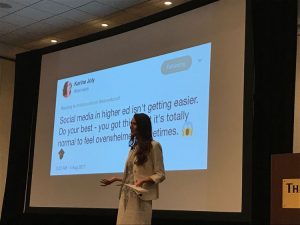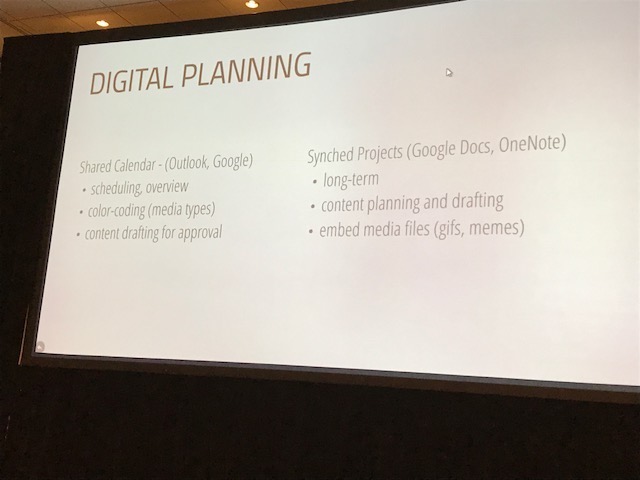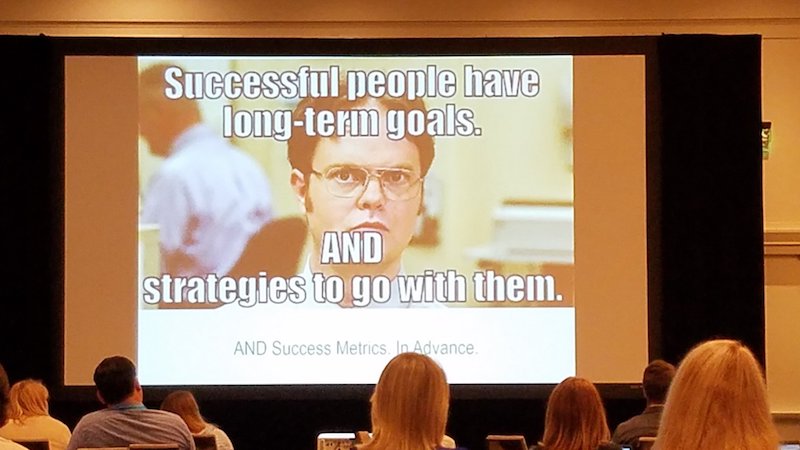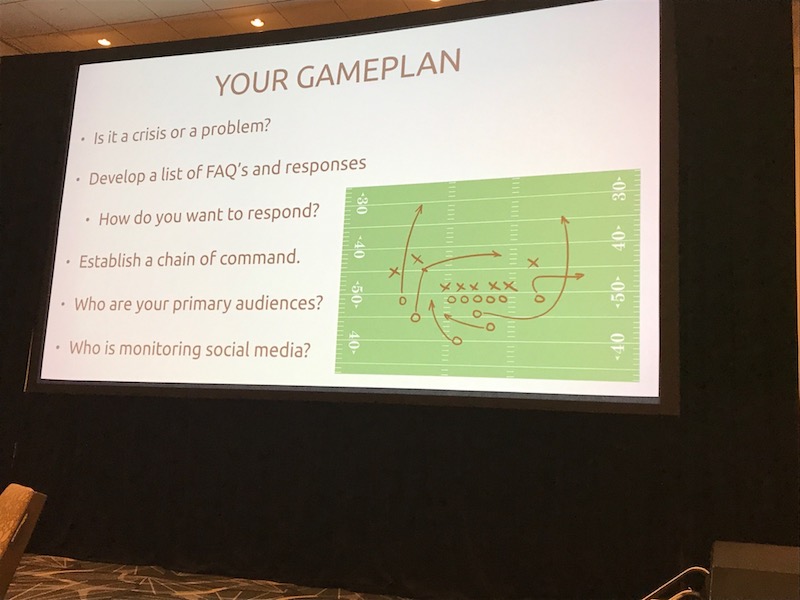
 The EduWeb Digital Summit took place August 7th-10th in Boston, Massachusetts, and it was an exciting event for hundreds of people in the industry.
The EduWeb Digital Summit took place August 7th-10th in Boston, Massachusetts, and it was an exciting event for hundreds of people in the industry.
There was so much information to absorb!
I’ve compiled a Top 10 list of takeaways from the different sessions I attended.
Whether or not you attended the summit, make sure to keep in mind these 10 points if you work in higher ed social media or digital marketing.
#1 Take Risks and Try New Things
The importance of taking risks and trying new things was reiterated in almost every single panel and discussion.
The digital world is always moving and changing, and we need to be able to adapt. Do not be afraid of trying out a new strategy or seeing how successful a different approach can be. No one is 100% certain where this industry will be in 5 years, and that means being open-minded and ready for change is the best way to be prepared for the future.
#2 Always Have a Plan
Having a plan was also a common thread throughout the summit, and the strategy depended on which track you attended.
Whether it was social media, email marketing, content development, or measurement and analytics, it all came to the same major point: You need to have a plan. Throwing darts randomly at an idea board will not lead to positive results. Every choice you make, including (and especially) the risky ones, needs to be thought out and planned.
- Who are you doing this for?
- What are you hoping to gain from it?
- How are you going to measure it?
- What do you consider a success?
- How can you do it better next time?
#3 Organize Your Plan

From A-Gen Z: Guiding Comprehensive Social Media Management Through Students
Once you have a plan, you need a clear way to execute it.
Too often people have good ideas and then forget when they are supposed to start it, or communicate poorly with other departments.
Have a clear schedule of how you will execute your plan/strategy.
Create a calendar for your team, or a group calendar if there are other departments involved, so everyone can be on the same page and have the necessary deadlines and details.
A well-organized plan has the best chance for success. The slide above describes how a student team became a well-oiled machine for their department by sharing calendars.
#4 Don’t Forget to Measure!
You cannot really know how successful your strategy was without the data to back it up. Success does not look the same for every project or every department, but it is necessary to future projects, so consider what measurement is for you.

At the summit, the Using Data and Analytics Track reiterated this in almost every panel. Not only will analytics inform your future project, it will be ROI (Return of Investment) proof for higher ups who need to understand the value of your work. Do not guess what your audience wants or what works; get the numbers and prove it.
#5 Video Is King
Video is the most successful tool to utilize right now digitally, and its popularity will only increase with time.
Most panels talked about video, but the Reimagining Video on Social Media from Boston University was the most comprehensive presentation on this topic. In it, the presenters discussed how to approach social media video specifically, the pitfalls and the upsides, and how Facebook estimates most content on the network will be video as time goes on. When creating video, always think about what platform you’re using, what the message is, who your audience is, and what will leave a lasting effect. Keep it short, interesting, and positive.
#6 Use Your Students
Students are an endless resource of information, content, and ideas. They are the eyes and ears of campus, enthusiastic about technology, and can take on duties that staff don’t have the time for. Make certain to organize your team well, provide direction, and always be willing to listen to their ideas.
#7 Create Clear Guidelines

From When Good Tweets Go Bad! Social Media in the Crisis Age
Digital media does not come naturally to everyone.
It is important to have guidelines that clearly explain the approach to content, strategy, and the proper ways to use social media. Whether it’s guidelines for your student team or for other departments, it is important that everyone on the campus is on the same page and working toward the same goals. You know the best practices, so write them down and circulate.
This is integral to crisis management when social media turns on you; have an exact agreed upon plan on how to respond in an emergency.
#8 Listen, Listen, Listen

From Using Social Listening to Uncover Content and Storytelling Opportunities
Understanding your audience and community is necessary in order to create the best strategies. A primary way to do that is by listening. Use listening tools to their best advantage to understand what your audience is saying about your brand. This can also help during crisis management. If a customer/community member is unhappy with you, you can defuse the situation quickly. If you never see that, the discord can spread. Building relationships with key advocates (someone who is active online and passionate about you) will pay off in the future as they’ll be a cheerleader for you.
#9 Network With Your Industry
A major benefit of this conference was for like-minded professionals to get together and share their strategies and passions.
By connecting and learning from each other, we are able to go back to our work invigorated and more knowledgeable.
There’s nothing wrong with checking out what other people are doing and how it could apply to your campus. Read each other’s tweets, blogs and subscribe to newsletters for new ideas. You can even take Higher Ed Experts’ online courses where all the students work in universities and colleges like yours.
#10 Virtual Reality? Not yet.
Virtual Reality may be the future… but we still work in the present.
It was talked about a few times, and many discussed how it could be huge down the road, but we are not there yet. Still, keep an eye out for it, and any other new exciting tools that are around the corner. Always listening, always learning, right?
Meet the Author: Chelsea Doyle
Chelsea Doyle is the Digital Community Manager at Bowdoin College. She is also a graduate of Higher Ed Experts’ professional certificate programs in Social Media Marketing for Higher Ed and Social Media Measurement for Higher Ed
Tags: Higher Ed Marketing Memos, Higher Ed News